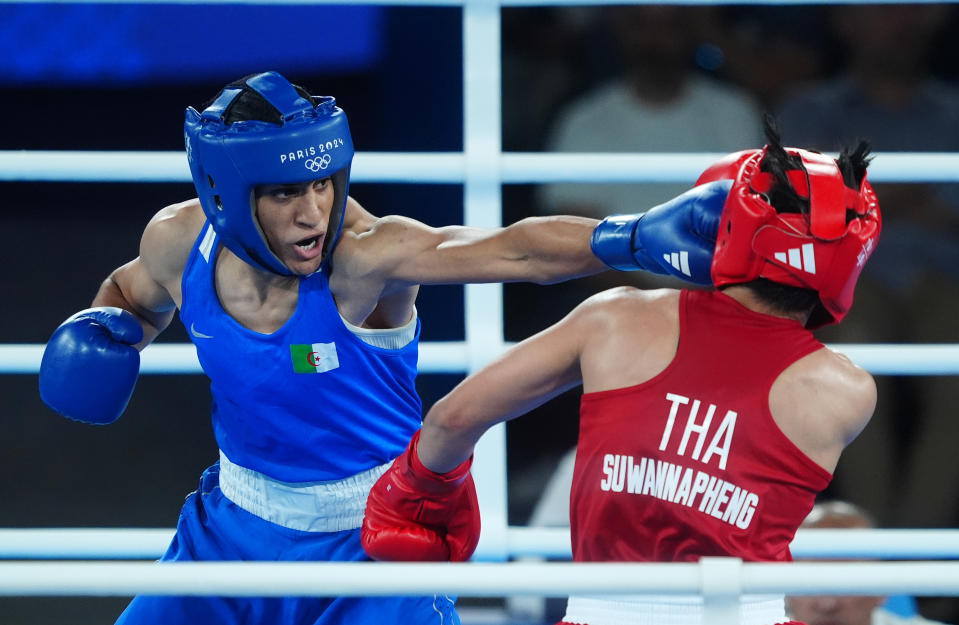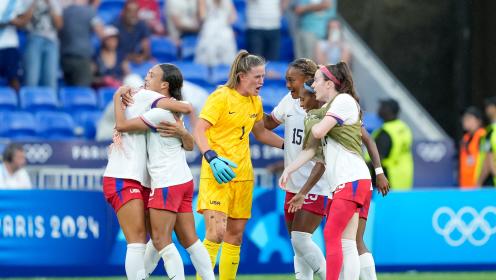
PARIS — The story of the Olympics’ boxing gender controversy moved to a grander stage on Tuesday night, as Algeria’s Imane Khelif won a unanimous decision and now moves on to fight for an Olympic gold medal.
Khelif squared off against Thailand’s Janjaem Suwannapheng shortly after 10:30 p.m. under the closed roof of Roland-Garros Stadium, before a raucous and engaged crowd. The echoes in cavernous Roland-Garros were far louder than tiny North Paris Arena, where Khelif’s Olympic journey began.
Algerian flags lined Roland-Garros’ lower sections, and Khelif entered the arena second, to the night’s loudest cheers and deafening chants of “I-MANE.” Wearing blue trunks and top, she stormed into the arena, punching the air. Khelif and Suwannapheng tapped gloves at the center of the ring, and the fight began.
In Round 1, Khelif once again used her reach advantage, keeping Suwannapheng at a distance before landing jabs. Suwannapheng spent much of the early part of the round in a defensive crouch, and the crowd, sensing her conservatism, tried to rally Khelif with loud chants of “I-MANE.” With just over a minute remaining in the round, Khelif charged in and caught Suwannapheng in a clinch, forcing the referee to step in and break up the pair. Khelif won the first round 10-9 on all five judges’ cards.
Round 2 began with Khelif again taking the fight to Suwannapheng, but this time Suwannapheng fought back, charging inside Khelif’s reach to land a few early blows. Seventy-five seconds into the round, Khelif caught Suwannapheng with a hard uppercut that seemed to stagger her. Suwannapheng’s counterpunches became wilder, most failing to land. The two again tapped gloves as the round ended. Khelif again won the round 10-9 on all cards.
In the final round, Suwannapheng took an aggressive tack right from the start, appearing to stagger Khelif while also clutching at her. Khelif landed some powerful roundhouse blows to the side of Suwannapheng’s head, and even lost her balance in her aggressive attack. Referee Shawn Reese of the United States let the fighters clinch, and as the seconds wound down, Khelif used the maneuver to sap Suwannapheng’s energy. Knowing she needed a knockout, Suwannapheng charged straight into Khelif’s jabs. But it wasn’t enough, and the judges gave Khelif another 10-9 win as the crowd roared. Khelif danced and grinned in the middle of the ring, to the delight of the crowd.
Khelif and Chinese Taipei’s Lin Yu-ting, who is scheduled to fight tomorrow night in the 57kg semifinals,, stand at the center of a complex controversy over gender and eligibility, a story fraught with politics, bureaucracy, misinformation and varying applications of science. Khelif has been in the world’s spotlight ever since her first bout last Thursday, when her opponent, Italy’s Angela Carini, tapped out after just 46 seconds.
Carini tearfully complained after the fight that Khelif’s punches were too hard. That charge quickly sparked a worldwide firestorm as Khelif and Lin had failed gender qualification tests administered by the International Boxing Association in 2022 and 2023. In a coincidental reunion, Khelif had beaten Suwannapheng, Tuesday night’s Olympic opponent, in the semifinals of the 2023 world championships before being disqualified by the IBA.
However, since the International Olympic Committee had severed ties with the IBA and no longer recognizes it as a legitimate boxing authority, the tests did not come into play when determining the boxers’ eligibility for these Olympics. Instead, in the absence of any independent regulatory authority, the IOC dismissed the IBA’s tests out of hand and instead relied on the boxers’ passports to determine their gender eligibility. Both boxers were born female and have lived as females their entire lives, and the IOC has maintained that this is the only necessary metric for judging their qualifications.
The IBA attempted to explain the specifics of its tests and the rationale behind them in a hastily-called Monday press conference, but any useful information the organization could have shared was drowned out by a chaotic cascade of grievances and rants against the IOC. Meanwhile, the IOC has insisted that the matter is a closed one for these Games, but has allowed that the passport-based system of gender qualification for boxing could be reconsidered in years to come.
Khelif now moves on to the gold medal match, scheduled for Friday evening at 10:51 Paris time. Lin will fight Wednesday night in the 57kg semifinal round. Both have clinched at least bronze medals. This story will remain alive a bit longer, and so will the misinformation and abuse that’s become inextricable.

